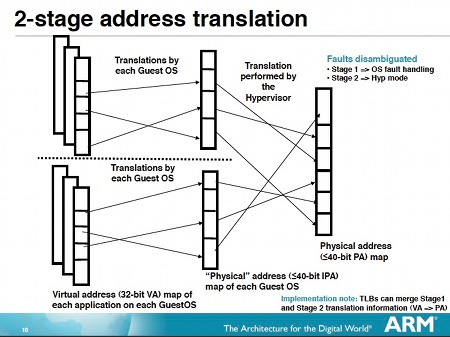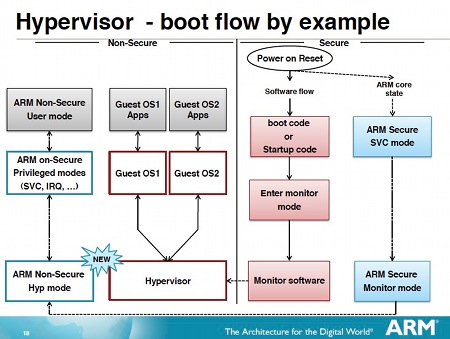Next-gen ARM cores break memory barrier, add hypervisor support
Aug 26, 2010 — by LinuxDevices Staff — from the LinuxDevices Archive — 25 viewsARM Holdings has provided new details about its next-generation Cortex-A series processor core, currently code-named “Eagle.” In a presentation at this week's “Hot Chips” conference, the company described relevant extensions to its ARMv7-A architecture, including hypervisor extensions and the ability to address more than 4GB of RAM.
ARM has revealed relatively little about Eagle, but it's known to be an upgrade to the company's current high-end processor cores, the Cortex-A8 and Cortex-A9. In a February conference call for investors, ARM CEO Warren East said "Eagle … takes our application processor products onto yet another level of high performance."
According to a variety of reports, Eagle will include a multi-core main processor, "high-end" graphics, and power usage that can be kept down by using Global Foundries' 28nm production process. Earlier this month, Texas Instruments (TI) touted itself as "the first licensee of the next-generation ARM Cortex-A series processor core" and suggested that Eagle will be at the heart of future entries in its OMAP product line.
Now, thanks to a presentation at this week's Hot Chips conference (held at Stanford University) by ARM Architecture Program Manager David Brash, we know some of the new capabilities Eagle will have. Brash didn't cite Eagle by name, but described what he termed extensions to the ARMv7-A architecture, adding that "ARM's first implementation is well advanced."
Since top-end ARM chips are currently 32-bit designs, they're limited to addressing 4GB of RAM (though, of course, most current products based on them offer far less). According to Brash, ARM will ease the pressure on this memory limit by adding a feature known as LPAE (large physical address extension).

LPAE will let ARM CPUs work with physical memory up to 1TB
(Click to enlarge)
It's said an operating system or hypervisor (see later in this story) will be able to access up to a terabyte of main memory, thanks to a translation of 40-bit physical memory addresses to 32-bit virtual memory addresses. Essentially, LPAE will allow large amounts of RAM to be added while making the core "think" it's just using a 4GB memory space.
Brash added that such copious amounts of memory will come in handy when an ARMv7-A core is used to run multiple operating systems simultaneously. A new "Hyp" mode will allow hypervisors to be in complete control of virtualized resources, while at the same time minimally intervening in "routine" guest operating system tasks, he said.

ARM's high-end CPUs will include built-in hypervisor support
(Click to enlarge)
According to Brash, ARM will work to enable both full virtualization solutions, where guest operating systems can run without change, and para-virtualization solutions, where guest software is expressly modified. The company will make further details available by the end of this quarter, and plans to engage with third parties such as ENEA, Green Hills, Mentor Graphics, Open Kernel Labs, VirtualLogix, and VMWare, he added.
VMWare has touted an MVP product that derives from its 2008 acquisition of Trango, and which would let an ARM-based phone or other device to run multiple operating systems simultaneously. While one OS is likely enough for most users, it's said a hypervisor would also allow phone manufacturers, or even carriers, to switch ARM devices from one OS to another as the market demanded, with little additional work.
Another use for ARM virtualization could be in servers. While few, if any, data centers have employed ARM chips, an Austin, Texas-based company called Smooth-Stone is touting "data center performance with cell phone power," and says it is working to create ARM-based server CPUs. Earlier this month, Smooth-Stone, founded in 2008, announced it had raised $48 million in backing from key investors, including ARM Holdings itself and TI.
Separately, a report by the website SemiAccurate reported that Facebook will be employing ARM servers in an upcoming data center it's building in Orgeon. Charlie Demerjian writes, "all the rumors point to Smooth-Stone" as being the company's chip supplier.
Further information
Further coverage of David Brash's Hot Chips presentation may be found on The Register, to which we are indebted for hosting a relevant PDF file. The coverage may be found here, while Brash's PDF may be found here.
SemiAccurate's report about Facebook may be found here. Further information about Smooth-Stone may be found here.
This article was originally published on LinuxDevices.com and has been donated to the open source community by QuinStreet Inc. Please visit LinuxToday.com for up-to-date news and articles about Linux and open source.